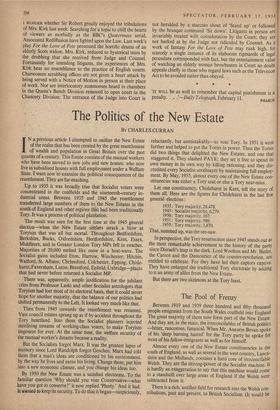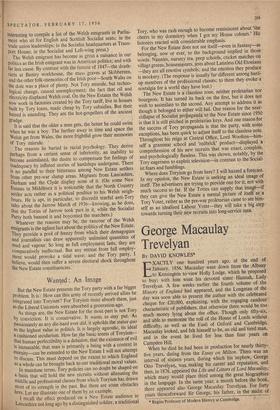The Politics of the New Estate
BY CHARLES CURRAN IN a previous article I attempted to outline the New Estate of the realm that has been created by the great resettlement of wealth and population in Great Britain over the past quarter of a century. This Estate consists of the manual workers who have been moved to new jobs and new homes; who now live in subsidised houses with full employment under a Welfare State. I want now to examine the political consequences of the resettlement. They are far-reaching.
Up to 1935 it was broadly true that Socialist voters were concentrated in the coalfields and the nineteenth-century in- dustrial areas. Between 1935 and 1945 the resettlement transferred large numbers of them to the New Estates in the south of England and other regions that had been traditionally Tory. It was a process of political plantation.
The result was seen for the first time at the 1945 general election—when the New Estate settlers struck a blow at Toryism that was all but mortal. Throughout Bedfordshire, Berkshire, Bucks, Oxfordshire, Hertfordshire, Kent, Essex, Middlesex, and in Greater London Tory MPs fell in swathes. Majorities of 20,000 melted like snow in a heat-wave. The Socialist gains included Eton, Harrow, Winchester; Hitchin, Watford, St. Albans; Chelmsford, Colchester, Epping; Chisle- h urst, Faversham, Luton, Brentford, Enfield, Uxbridge—places that had never before returned a Socialist MP.
There was, apparently, ample justification for the jubilant cries from Professor Laski and other Socialist astrologers that Toryism had lost most of its electoral basis, that it could never hope for another majority, that the balance of our politics bad shifted permanently to the Left. It looked very much like that. Then from 1945 onwards the resettlement was resumed. Vast council estates sprang up as if by accident throughout the Tory heartland. Into them the Socialist planners injected sterilising streams of working-class voters, to make Toryism impotent for ever. At the same time, the welfare security of the manual worker's dreams became a reality.
But the Socialists forgot Marx. It was the greatest lapse of memory since Lord Randolph forgot Goschen. Marx had told them that a man's ideas are conditioned by his environment. by the way he lives and earns his living. Change these, put him into a new economic climate, and yOu change his ideas too.
By 1950 the New Estate was a satisfied electorate. To the familiar question 'Why should you vote Conservative—what haye you got to conserve?' it now replied 'Plenty.' And it had. It vaulted to keep its security. To do that it began—suspiciously, reluctantly, but unmistakably—to vote Tory. In 1951 it went further and helped to put the Tories in power. Then the Tories did two things that delighted the New Estates, and one that staggered it. They slashed PAYE: they set it free to spend its own money in its own way by killing rationing; and they dis- credited every Socialist soothsayer by maintaining full employ- ment. By May, 1955. almost every one of the New Estate con- stituencies was either a Tory seat or else a Tory near-miss.
Let one constituency, Chislehurst in Kent, tell the story of them all. Here are the figures for Chislehurst in the last five general elections : 1935: Tory majority, 26,478. 1945: Socialist majority, 6,279. 1950: Tory majority. 167. 1951: Tory majority, 980. 1955: Tory majority, 3,870.
That, summed up, was the see-saw.
In perspective, the Tory resurrection since 1945 stands out as the most remarkable achievement in the history of the party since Disraeli's leap in the dark. Lord Woolton and Mr. Butler, the Carnot and the Dumouriez of the counter-revolution, are entitled to celebrate. For they have led their captors captive. They have enlarged the traditional Tory electorate by adding to it an army of allies from the New Estate.
But there are two skeletons at the Tory feast.
The Pool of Frenzy
Between 1919 and 1939 three hundred and fifty thousand people emigrated from the South Wales coalfield into England The great majority of them now form part of the New Estate. And they are, in the main. the irreconcilables of British politics —bitter, rancorous, fanatical. When Mr. Aneurin Bevan spoke of his 'deep burning hatred' for the Tory party he spoke for most of his fellow-emigrants as well as for himself.
Almost every one of the New Estate constituencies in the south of England. as well as several in the west country. Lanca- shire and the Midlands, contains a hard core of irreconcilable Welsh. They are the driving-power of the Socialist machine. It is hardly an exaggeration to say that this machine would come to a standstill over large areas of England if the Welsh were subtracted from it.
There is a rich.' unfilled field for research into the Welsh con- tributions, past and present, to British Socialism. (It would be interesting to compile a list of the Welsh emigrants in Parlia- ment who sit for English and Scottish Socialist seats; in the trade union leaderships; in the Socialist headquarters at Trans- port House; in the Socialist and Left-wing press.) The Welsh emigrant has become as great a nuisance in our Politics as the Irish emigrant was in American politics; and with far less cause. By contrast with the famine of 1847—the death- carts at Bantry workhouse, the mass graves at Skibbereen. and the other folk-memories of the Irish poor—South Wales on the dole was a place of plenty. Not Tory misrule, but techno- logical change, caused unemployment; the fact that oil and electricity displaced Welsh coal. On the New Estates the Welsh now work in factories created by the Tory tariff, live in houses built by Tory loans, made cheap by Tory subsidies. But their hatred is unending. They are the hot-gospellers of the ancient grudge.
It is said that the older a man gets, the better he could swim When he was a boy. The further away in time and space the Welsh get from Wales, the more frightful grow their memories of Tory misrule.
The reasons lie buried in racial psychology. They derive Perhaps from a certain sense of inferiority, an inability to become assimilated, the desire to compensate for feelings of inadequacy by inflated stories of hardships undergone. There is no parallel to their bitterness among New Estate settlers from other pre-war slump areas. Migrants from Lancashire, Durham and the Clyde display none of it. (On some New Estates in Middlesex it is noticeable that the North Country settler acts rather as a political poultice to his Welsh neigh- bours. He is apt, in particular, to discredit tearful anti-Tory tales about the Jarrow March of 1936—knowing, as he does, that the Tories of Jarrow took part in it, while the Socialist Party both banned it and boycotted the marchers.) Whatever the reasons may be, the rancour of the Welsh emigrants is the ugliest fact about the politics of the-New Estate. They provide a pool of frenzy from which their demagogues and journalists can draw apparently unlimited quantities of mud and vapour. So long as full employment lasts, they are Comparatively ineffectual. But any retreat from full employ- ment would provoke a tidal wave; and the Tory party, I believe, would then suffer a severe electoral shock throughout the New Estate constituencies.'
Wanted : An Image
But the New Estate presents the Tory party with a far bigger problem. It is : How can this army of recently arrived allies be integrated into Toryism? For Toryism must absorb them, just as the Liberal Unionists were absorbed a generation ago.
As things are, the New Estate for the most part is not Tory by conviction. It is conservative. it wants to stay put. As Passionately as any die-hard ever did, it upholds the status quo as the highest value in politic's. It is largely agnostic, its ideal a cushioned secularism. How far the basic tenets of Toryism— that human perfectibility is a delusion, that the existence of evil is immutable, that man is primarily a being with a context in eternity—can be extended to the New Estate I will not attempt to discuss. This must depend on the extent, to which England as ,a whole can be brought back to our traditional moral values.
In mundane terms, Tory policies can no doubt be shaped on a basis that will hold the new recruits without alienating the middle and professional classes from which Toryism has drawn most of its strength in the past. But there are some obstacles here. Let me illustrate one of them by an example.
I recall the effect produced on a New Estate audience in Lancashire not long ago by a distinguished soldier, a traditional Tory, who was rash enough to become reminiscent about 'the cheers in my dormitory when I got my House colours.' His listeners reacted with considerable emphasis.
For the New Estate does not see itself—even in fantasy—as belonging, now or ever, to the background implied in those words. Nannies, nursery tea, prep schools, cricket matches on village greens, housemasters, jests about Latinless Old Etonians —they are all emotive symbols; and the emotion they produce is mockery. (The response is usually far different among hard- up members of the professional classes; to them they evoke a nostalgia for a world they have lost.) The New Estate is a classless zone, neither proletarian nor bourgeois. It has turned its back on the first, but it does not wish to assimilate to the second. Any attempt to address it as though it belonged to either will fail. One reason for the near- collapse of Socialist propaganda to the New Estate since 1950 is that it is still pitched in proletarian keys. And one reason for the success of Tory propaganda is that the party, with some exceptions, has been quick to adjust itself to the classless note. Throughout his reign at Central Office, Lord Woolton—him- self a grammar school and 'redbrick' product—displayed a comprehension of his new recruits that was exact, complete, and psychologically flawless. This was shown, notably, by the Tory eagerness to exploit television—in contrast to the Social- ist fears and fumblings.
Where does Toryism go from here? I will hazard a forecast. In my opinion, the New Estate is seeking an ideal image of itself. The advertisers are trying to provide one for' it, not with much success so far. It the Tories can supply that image—if they can give the New Estate a mental picture of itself as 'a Tory Voter, rather as the pre-war proletarian came to see him- self as an idealised Labour Voter—they will take a big step towards turning their new recruits into long-service men.



































 Previous page
Previous page